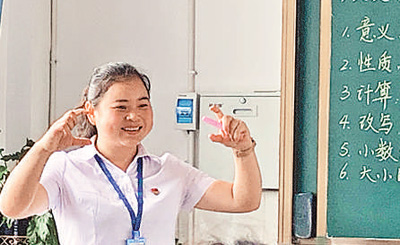(Xinhua)10:06, August 07, 2020![]()
Qin Yuans fingers danced across the keys of an electric piano as six boys belted out a popular song — Im still the teenager I once was, without the slightest change in my heart…
The song has been a hit among Chinas young urbanites since last year, and the children sang whole-heartedly to their teachers accompaniment in the Wangjia village school in central Chinas Hunan Province.
The singing session is a daily routine at the school, which has only one teacher and six students — all first-graders.
The school in Hecheng District of Huaihua City was established by the government exclusively for the local school-age children who are too young to hike long distances to school. After their first year of primary education here, they will transfer to a bigger school in the township of Huangjinao.
Qin, 21, is the only teacher at the school. But teaching is not all in her life. After one days work, she would jump on an electric bicycle and rush to a plaza in the city of Huaihua 16 km away, where her home is. There, she sings with a band, a microphone in her hand and a smartphone set up in front of them for livestreaming.
Qin started working at the village school last year, after finishing five years of training in teaching methodology, multi-disciplinary knowledge like Chinese literature and language, art, math, child psychology and practically every skill to prepare her for being a versatile primary school teacher.
I love kids, and Ive always longed to be a teacher, she said. It doesnt really matter whether I have 100 students or only one.
Every morning, Qin rides from the city to her workplace to give lessons on subjects like Chinese, math, music and physical education, among others.
Besides teaching, her daily routine also includes preparing lunch for the students. The lunch is subsidized by the local government, and the kids only need to pay 200 yuan (about 29 U.S. dollars) a semester each.
From September 2019 to July this year, there were altogether six boys studying at the school. Most of them are left-behind children who are taken care of by their grandparents, while their parents work in cities for a higher income to support their families.
Seven-year-old Xiao Chen (pseudonym) is one of Qins students. He lives with his grandmother in the village, and his parents both work in the eastern Chinese city of Hangzhou some 1,200 km away.
To Xiao Chen, Qin is more like an elder sister or a mother than a teacher.
His grandmother once asked what he liked most about the teacher. I like the dish she stewed, braised pork with potatoes, in particular, the boy said.
As a novice at cooking, Qin finds it challenging to cook for the kids. She seeks advice from her family members, searches recipes online, and keeps practicing to polish her cooking skills.
Her efforts have paid off. I usually make braised pork with potatoes on Friday as a reward for them, if they behave well during the week. The meal has become the boys favorite. Qin said the trick always works its wonders.
The boys she teaches seldom have an opportunity to reach out to the outside world, and some of them are rather introverted and reserved.
To help the boys become more outgoing, Qin teaches them pop songs that she usually performs at the plaza. I want to open a window to the outside world for the kids, she said. I hope they can express themselves more bravely through singing.
According to Qin, the facilities of the school are good enough — an electric piano, computers and experimental apparatus in the brand-new classrooms greatly facilitated her teaching.
However, the difficulty in her work lies in figuring out how to educate the children in a way that better suits their situations.
I have been thinking how to help these kids, whose parents are not around, better study and live their lives, Qin said.
She therefore reaches out to the kids parents more often — not only reporting their learning conditions to the parents, but also encouraging the parents to care more about their children.
Seeing the students grow up and getting recognition from their parents are so rewarding for a teacher, Qin said.
In September, the six boys will go to a primary school in the township of Huangjinao to further their schooling.
Under an agreement reached between her and the local education authority, Qin will continue teaching in the village school for another four years.
I dont know if I will stay here or leave after the contract ends, Qin said. But I will continue working as a teacher for sure, as the song says — the faith in my heart will never fade away.



